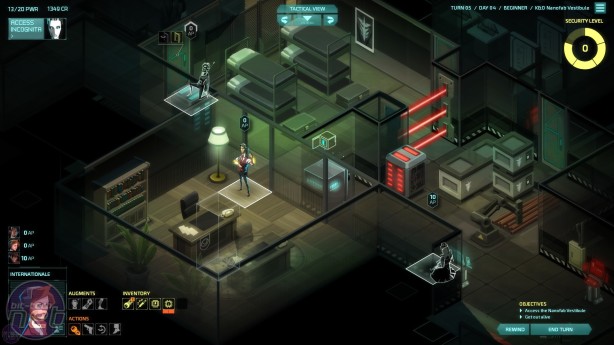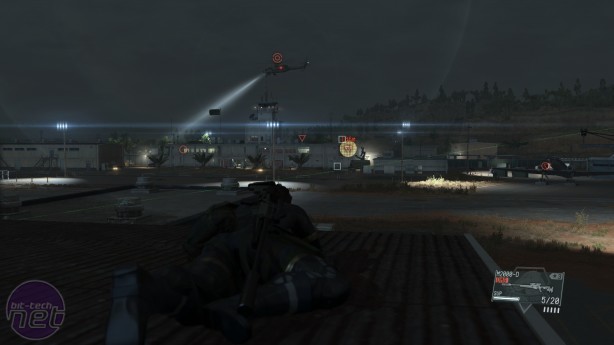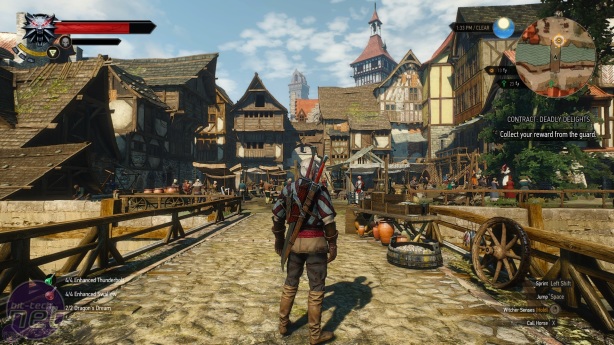3. Invisible Inc
Klei Entertainment seem to go from strength to strength. Mark of the Ninja is a fantastic stealth platformer, and Don’t Starve one of the best survival games around. Invisible Inc continues the studio’s golden streak. Its portrayal of a rogue team of spies hacking into high-security facilities against the clock is a masterclass in tension.
What makes Invisible Inc such a thrill is how it sets up its short and long game in direct conflict with one another. From the moment you infiltrate a compound, time is against you. For each turn you linger in these hostile spaces, the alert meter ticks up and security tightens. Ideally, you need to get in, complete your objective, and get out as quickly as possible.
At the same time, however, you’ve only got 72 in-game hours before you MUST tackle the exceptionally difficult final mission. To stand any chance, you need plenty of equipment and a bunch of highly skilled agents. Acquiring these requires money, which means ransacking
every building you infiltrate as thoroughly as possible.
The incompatibility of these requirements results in thrilling risk/reward scenarios. Every decision matters, every gamble could make or break your team, and you won’t know for sure which it is until you attempt that last mission. In terms of systemic ingenuity, few games rival Invisible, Inc.
2. Metal Gear Solid V: The Phantom Pain
It's the layers that make Metal Gear Solid V special. As a stealth game, it is a beautiful and exactingly tuned machine, but its basic mechanics follow on fairly predictably from those pioneered in Thief, Splinter Cell and, of course Metal Gear's own heritage. Its newly introduced open world is not the largest nor the most visually arresting, and narratively it is surprisingly minimalist.
It's only in the long game where the majesty of Kojima's Metal Gear swansong reveals itself. That open world may not be as huge or dramatic as others, but it is designed entirely around the notion of Metal Gear's hallmark tactical espionage. The range of possible approaches available to the player is astounding, from good old fashioned black-ops sneaking to arriving at the front gates with tanks, artillery, helicopter support; the works.
Most impressive of all is the way the game changes depending on your approach. The sentries who patrol the outposts and facilities you infiltrate constantly change their tactics to combat your own, wearing helmets to prevent you tranquilising them, setting up decoy soldiers to fool you, putting on gas-masks if you employ gas-grenades. What's more, the exquisite Fulton balloon system encourages you to use the people and equipment within those bases to your own ends, rather than simply destroying them. This adds further complexity to an already remarkably detailed stealth game.
The Phantom Pain features possibly the only open world game where that world becomes more interesting the longer you spend time in it. It is fleshed out rather than emptied out, and that is a truly remarkable feat. The storytelling that many Metal Gear fans appear to crave may not be at its strongest in the Phantom Pain, but it's a sacrifice that's made absolutely worthwhile by the staggering complexity and depth of the all-out game that Kojima offers in its stead.
The Witcher 3
Bit-tech's game of 2015 is the one that ate 80 hours of my life and left me wanting more. So many open world games run out of steam before even the halfway mark, but the Witcher 3 just keeps on going through the sheer strength of its character. By this I don't mean Geralt, although he certainly transcends the "gruff white dude" stereotype with his newfound paternal warmth, nor any of the other members of CD Projekt's stellar cast.
No, I mean the character of the world itself, and more specifically, the way that world reflects Geralt as an individual. Everything in the game is designed to complement the idea of being a Witcher. You can see it in the aesthetic, the way the world conveys a sense of both weariness and wildness, capable of stunning beauty from time to time, but more likely to feel eerie and dangerous. Each sidequest and mini-attraction falls within acceptable realms of what a Witcher would do (except for maybe horse-racing, but even that is technically feasible).
The quests are a quagmire of moral uncertainty which Geralt inevitably sinks into despite his best efforts. Even when he tears himself away from the politicking of Nilfgaard or the scheming gangs of Novigrad to do some good old fashioned monster hunting, he often finds the true monsters are not the ones he has been contracted to kill.
Most of all though, it's the humanity that shines through all this murk, just as it manages to shine through Geralt's cat-like eyes, that makes the Witcher 3 such an absorbing experience. This is a dark game filled with misery and cruelty, but more importantly it's a warm one. Its sprawling story is bound together by believable friendships and meaningful relationships, and the hefty fantasy script is lightened by a wicked sense of humour, one which is often as important in holding back the threat of the Wild Hunt as everything Geralt, Yennefer, Ciri and all the others do to stop it. It is without question our game of the year.
No other game is as consistently enjoyable for its duration, not even the masterly work of Kojima in MGS V. No other game makes me jealous of all the other people who haven't played it yet, as they have no clue what awaits them in the war-torn lands of Velen. It is an absolute triumph.

MSI MPG Velox 100R Chassis Review
October 14 2021 | 15:04













Want to comment? Please log in.